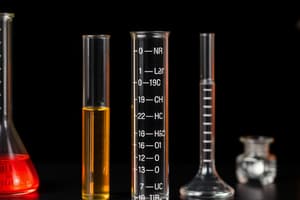Podcast
Questions and Answers
What is the study of rates of chemical reactions called?
What is the study of rates of chemical reactions called?
- Reaction kinetics (correct)
- Chemical equilibrium
- Stoichiometry
- Thermodynamics
How are units of concentration usually expressed?
How are units of concentration usually expressed?
- Molarity
- mol dm−3 (correct)
- kg/m3
- g/L
What does the balanced chemical equation provide information about?
What does the balanced chemical equation provide information about?
- The concentration of the reactants
- The reactants and products involved (correct)
- The rate of the reaction
- The mechanism of the reaction
What are the units of time usually expressed in when measuring rate of reaction?
What are the units of time usually expressed in when measuring rate of reaction?
What does the study of rates of chemical reactions allow deductions about?
What does the study of rates of chemical reactions allow deductions about?
What is the study of rates of chemical reactions called?
What is the study of rates of chemical reactions called?
What can we deduce about the mechanism of a reaction from the data gathered in rate experiments?
What can we deduce about the mechanism of a reaction from the data gathered in rate experiments?
What information does the balanced chemical equation provide about the rate of a reaction?
What information does the balanced chemical equation provide about the rate of a reaction?
What units are usually used to express concentration when measuring rate of reaction?
What units are usually used to express concentration when measuring rate of reaction?
What units are usually used to express time when measuring rate of reaction?
What units are usually used to express time when measuring rate of reaction?
Flashcards are hidden until you start studying
Study Notes
Chemical Kinetics
- The study of rates of chemical reactions is called chemical kinetics.
- Units of concentration are usually expressed in moles per liter (mol/L), also known as molarity (M).
- A balanced chemical equation provides information about the stoichiometry of a reaction, which refers to the relative amounts of reactants and products involved. It tells us the number of moles of each reactant and product that are involved in the reaction.
- Units of time are usually expressed in seconds (s) when measuring the rate of a reaction.
- Studying the rates of chemical reactions allows deductions about the mechanism of a reaction, which is the step-by-step process by which the reaction occurs.
- Chemical kinetics allows us to deduce the mechanism of a reaction.
- Rate experiments can provide information about the order of the reaction, which refers to the power to which the concentration of each reactant is raised in the rate law and the molecularity of each elementary step in the mechanism.
- The balanced chemical equation does not provide information about the rate of a reaction.
- Concentration is typically expressed in moles per liter (mol/L).
- Time is typically expressed as seconds (s).
Studying That Suits You
Use AI to generate personalized quizzes and flashcards to suit your learning preferences.




